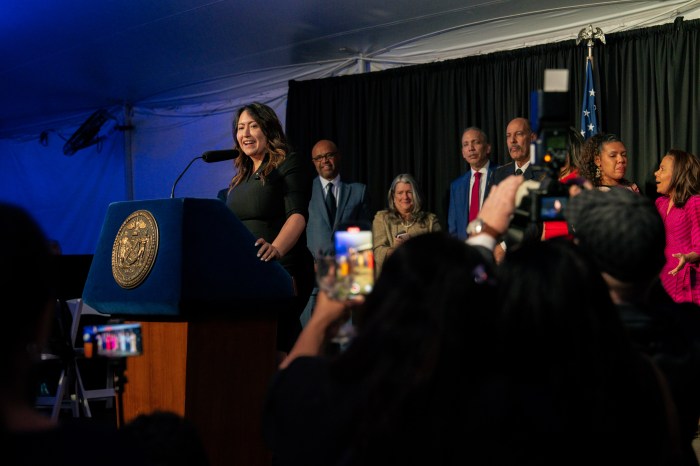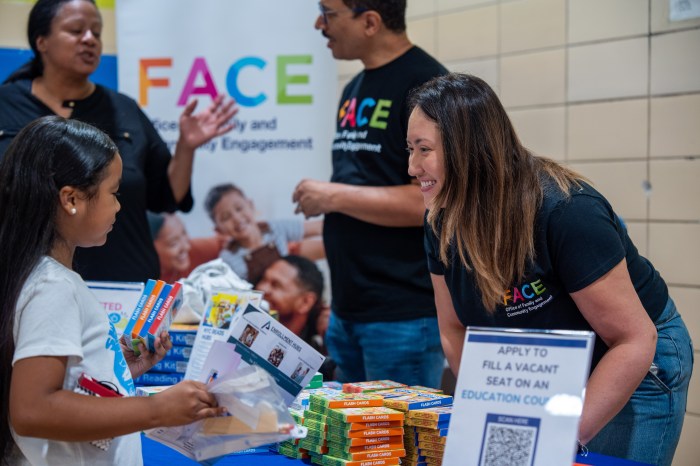New schools chancellor Aviles-Ramos talks cellphone bans, class size and why family empowerment is key

NYC Public Schools (NYCPS) will have a new chancellor in less than a week.
After nearly two months of turmoil in City Hall with an indicted mayor, federal probes and a seemingly endless series of abrupt resignations, Deputy Schools Chancellor Melissa Aviles-Ramos is ready to take the helm of the largest public school district in the nation by implementing new ideas, but also sticking with what works.
The theme of her upcoming administration? Family empowerment.
“What I will say is that family empowerment is going to be a key piece, as well as teacher leadership, and of course, the physical and emotional safety of our children is very important,” the career educator and mom of a young public-school student, said. “So you’ll see things in those areas.”
Aviles-Ramos has ideas and plans that she said will be announced in detail as she transitions more into her role as the city schools’ big boss, overseeing more than 1,800 public schools attended by nearly one million students.
But she does not plan to totally re-invent the education wheel. She has no plans to scrap all of her predecessor, current Schools Chancellor David Banks’ initiatives, especially NYC Reads, a literacy program that requires all city elementary schools to follow a uniform curriculum by this academic year to improve student reading skills.
Banks, who is set to retire on Oct. 16 amid ongoing federal probes into several high-ranking City Hall officials, including himself and his wife, former First Deputy Mayor Sheena Wright, launched NYC Reads in 2023 to improve reading scores and, simply put, make kids better readers.
According to Department of Education (DOE) statistics, two-thirds of Black and Latino students are not reading at grade level, and students in temporary housing and others who have formal gaps in their education can fall behind when moving to a new school using a different curriculum.
DOE officials have said of the program since its inception that standardized curriculum options, which are the centerpiece of NYC Reads, help ensure students have consistent instruction from grade to grade and school to school.
“I‘m not going to move any of that great work,” the incoming chancellor, who started her education career as an English teacher, said. “And who would want to stop prioritizing literacy?”

‘I’m not an outsider’
The Bronx native also has a message for New York parents and educators: She is not an outsider. She said she understands teaching, leading and what students and families need to thrive.
“I‘ve seen a few chancellors in my time at the DOE. And I think the first thing that happens every time there’s a new chancellor is for teachers to think, ‘What does this mean for us on the ground?,‘“ she said “You’re so worried as a teacher if you have to start a new curriculum, do you have to reorganize your classroom? Principals are worried about competing priorities.”
But, she said, she would not disrupt the status quo as the school year is already into its second month.
“I would never do that to the school system,” she said. “I have to center family, kids and teacher support. And the great thing about this is that I’m not an outsider. I share the same priorities and vision for NYC that the mayor has and that David Banks had.”

‘Hate has no place in our schools:‘ Aviles-Ramos on antisemitism, Islamophobia and other forms of discrimination
In addition to academics—especially reading—physical and emotional wellness and safety is a priority for the incoming DOE head.
Another hallmark of Banks’ tenure that Aviles-Ramos plans to continue in full force is the Meeting the Moment initiative, which addresses the increasing antisemitism in NYC public schools since the start of the Israel – Hamas war last year.
“The ‘Meeting the Moment’ work is so important, because hate has no place in our schools. And that is just a non-negotiable,” she said.
The initiative, which launched in January, includes more training for principals on school discipline code, an interfaith advisory council to provide ideas for engagement with faith-based communities, and most recently, a new hotline—718-935-2889—that students, parents, staff and the community can use to report harassment and discrimination.
“Our ‘Meeting the Moment’ work reaffirms our commitment to safe, inclusive, respectful school environments,” Aviles-Ramos said. “In challenging times across our country and world, it is especially important to teach our children to engage in constructive, empathetic dialogue on issues of the day.”
Focus on family
Aviles-Ramos has worked in the NYC public school system since 2007, and has been deputy chancellor of family and community engagement at the DOE since July. It has been a position that has suited her, especially given her focus on family empowerment and parental involvement in students’ education.
Through this role, she oversaw family and community engagement resources, including language access, parent leadership programs and community education councils. Much of this experience will be woven throughout her new role as chancellor, she explained.
“When families are empowered to be partners with their schools and teachers are supportive, then children learn,” she said. “So when we double down on student safety, teacher support and family empowerment students will learn.“
A possible cell phone ban and keeping class size down
Study after study has shown teachers would support a school cellphone ban. A United Federation of Teachers survey from September showed that NYC educators would likely support such a ban, building more support around a possible statewide policy that has been talked about for months.
How does Aviles-Ramos feel about a ban? She’s not against it, but admits it is not so simple to implement.
Currently, about 350 city schools have some restrictions on cellphone, some even have total bans. Children in elementary schools with cellphone bans are allowed to keep their phones in their backpacks as long as they are turned off.
“The concept of a cellphone ban and the implementation are two different things,” she said. “We want to make sure that we are engaging heavily and really focusing on what implementation would look like across the city respecting the identity of every school and knowing that every situation is different. And then make a decision moving forward.”
Aviles-Ramos will also have to continue Banks’ challenge of lowering class sizes in yearly increments per a NYS mandate. In compliance with the law, the city must cap classes to 20 students in grades K through three, 23 students in grades four to eight, and 25 students in high school classes by September 2028.
While Banks in recent months has stressed that there will be challenges going forward—even suggesting the possibility of having to lower teacher standards—Aviles-Ramos appears to be taking a more hopeful approach.
“We’re in compliance for this school year,” she said. “And recently we released our class-size plan, which was signed off by the UFT and the CSA [Council of School Supervisors and Administrators].”
Like Banks, the incoming chancellor admits there will be hurdles to lowering class size, but noting stakeholder engagement can’t fix.
“There will be challenges, but that’s why we work closely with our union partners and other folks within the agency and move forward,” she said.




